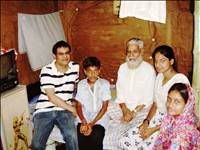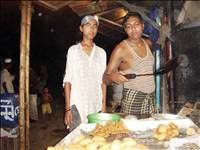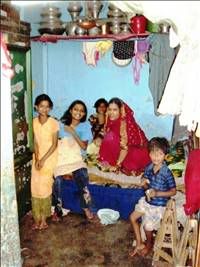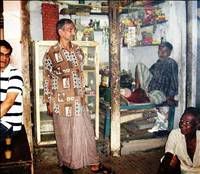It was almost by accident that I visited the Mohammadpur Geneva camp in Dhaka – one of the largest settlements housing thousands of stranded Pakistanis in Bangladesh. On my last visit to Dhaka, my guide Ronny offered the possibility of getting the best bihari kebabs in town. He told me that his house was near the place and I could meet him somewhere close.




This was an extraordinary afternoon when the receding sun was converting the sky into a field of unimaginable colours that artists can only aspire to create through their limited palettes. Dhaka, the noisy, overcrowded megapolis can be enchanting at times, especially during late springtime when the Krishnochura trees (the Flame of the Forest) bloom all over with their fiery flowers.
I almost cancelled the trip thinking that a walk in the park might be a better alternative to the usual South Asian gluttony. Quite soon, I arrived at the meeting point having rationalised my proclivity for indulgence.
Little did I know that the meeting point was nowhere but at the doorstep of Dhaka’s underbelly, the easy to ignore Bihari camp. Not until I had reached there had I realised how the wounds of 1971 were festering for hundreds and thousands of men, women and children who have waited for all these years to attain identity and citizenship of Pakistan. As if it were a curse, the Pakistani state soon forgot about their existence as its ethnic politics dominated the policy commitments of Bhutto. And for the Bangladeshis these were the “traitors” who continued to wave Pakistani flags when the vast majority of East Pakistanis revolted against the excesses and the might of Pakistan army following the infamous and mischievous army action of 1971.
In a few minutes I had all but forgotten about the famous Mustaqeem kebabs and parathas and forced Ronny to take me inside the camp. Very soon I realised I did not need any Bangla-speaking guide as the ghetto was Urdu speaking, and portraits of Pakistani leaders and flags could still be spotted despite the passage of three and a half decades. Ronny knew the locals and found his younger friends, child workers and idle youth who took charge of our little tour.
 Shamed by guilt and excited by the real experience, I wandered the smelly, open-drained and dark streets of the ghetto. I have frequented other slums but this one was special for it reeked of the contemporary elite politics, bloodshed and cold inhumanity that Pakistanis are shy of confronting. The living conditions would put any half-concerned South Asian to shame. The homes for most of the families comprised tiny little rooms, with all the belongings and large families concentrated in the inner space. No proper toilets and water supply – as if civilization had taken a backseat here.
Shamed by guilt and excited by the real experience, I wandered the smelly, open-drained and dark streets of the ghetto. I have frequented other slums but this one was special for it reeked of the contemporary elite politics, bloodshed and cold inhumanity that Pakistanis are shy of confronting. The living conditions would put any half-concerned South Asian to shame. The homes for most of the families comprised tiny little rooms, with all the belongings and large families concentrated in the inner space. No proper toilets and water supply – as if civilization had taken a backseat here.
The tragedy of these stateless people was immense and of an in-your-face variety. Such moments can only be experienced – readings and theorisations rarely help. Mohammadpur is just one of the 116 camps all over Bangladesh set up immediately after the Liberation War of 1971, euphemistically referred to as the “Fall of Dhaka” in our textbooks. How did all this happen?
Not unlike much of the mess afflicting the region, the Partition of India in 1947 witnessed large-scale communal riots and thousands of Muslims from Bihar, West Bengal and other provinces arrived in what was known then as East Pakistan. The refugee settlements, reminiscent of Karachi, were inward looking monocultural spaces, a little away from the Bengalis. In the complex political economy of a united Pakistan, “Biharis,” by now a composite term for the non-Bengali Pakistanis in East Pakistan, became the object of Bengali ire based on common perceptions that the state gave them a preferential treatment. It is estimated that by 1971, over 1.5 million such non-Bengalis, ‘Biharis,’ were present in East Pakistan.
In 1971, the Biharis were a torn community. The Pakistan army, sensing this divide, apparently recruited some Biharis to fight the rebellious Bengalis. Whether they supported the Pakistan army or not, many Biharis remained neutral in 1971, shy of taking sides with their local brethren.
Thus the schism widened in those tumultuous years leading to the sub-human ghettoisation of the wretched children of a lesser God. After the war in 1971, the International Community for the Red Cross intervened and found out that most Biharis wanted to migrate to the truncated Pakistan. Over half a million registered “Urdu-speaking” Pakistanis found a voice at the high level Simla pact of July 1972 and later an agreement was reached in 1973 between Pakistan, India and Bangladesh on this issue. As per the agreement, the Bengali prisoners were released and sent to Bangladesh. However, not all Urdu-speaking Pakistanis were repatriated to Pakistan. Even today hundreds of thousands live in Bangladesh in camps as non-citizens.
So Mohammadpur turned out to be an encircled little inferno located next to fairly well-to-do neighbourhoods and commercial areas. Human spirit however knows how to counter the forces of nature and history. Inside the camp, little Bihars had been recreated with the memories and longings that the migrants are well known for. The cuisine, the sweets and eateries were all preparing and selling the Bihar delights: Pua, prepared from a mixture of powdered rice, milk, ghee, and honey, Pittha (steamed powdered rice mix), Khaja (a sweet delicacy); and Ladoos, Kala Jamun, and so many others that have escaped my memory.
Handicrafts and automobile repairs were common professions. As I peeped into the dingy rooms – homes and workshops rolled into one – women and men were busy working on brightly coloured saris. Many youth find this their ordained profession. There were also places for recreation: snooker, carom boards and tea stalls. We stopped at a tea stall and sipped the milky tea with lots of sugar served with anarasas (sweet round-shaped snacks). For some reason many people had gathered there and my Pakistani status was now well-known. Details of Pakistan, Karachi and lost relatives were recounted with much passion. The tea stall owner, Ahmad’s brother, had escaped to Pakistan but Ahmad never heard from him for years. Sometimes these situations land you in a zone where words are empty and meaningless; and perhaps listening becomes the best mode of communication.
We got up and reached another side of the slum packed with Urdu-wallahs. There is obviously a hint of racism when the Biharis are mentioned in the mainstream parlance in Bangladesh. The older generation complains more than the younger ones, who by their situation are better integrated and bilingual. At a carom club, the young men tell me they like Pakistan but do not wish to go there. “This is our country and our home, we are Bangladeshis.” Others nodded and chuckled at the remark. Free of the baggage, the younger generations are far more ready to become Bangladeshis.
Probably this is the reason that civic activism has earned voting rights for those born after 1971. The court ruled in 2008 that “the refugees who were minors in 1971 or born after the independence of Bangladesh are citizens of Bangladesh,” after years of legal wrangling and ideological debates in the country. However, those who were adults in 1971 were not covered.
The warmth for a Pakistani was more palpable among the elderly. I was treated with much affection in their houses. Yes, I did visit them as well, trying hard to disguise my shock at what constituted “housing.” But the conversations were fun-filled and hearty. Mirza Saheb from Muzaffarnagar related the stories of how he migrated as a child with his family after communal riots of 1947 nearly destroyed them. Respect for Jinnah and the idea of Pakistan also filtered through the discussions. But then there were witty lines and little anecdotes as well on how some Pakistanis were half or quarter Pakistanis. The full status could only be earned if you are not a Bihari!
Education is a casualty. In part this is a result of marginalisation from the state services and in most cases a simple case of poverty where family-based work for money is more important than the luxuries of schooling. Stories of discrimination were also related as to how difficult it was get a job when you were from a stateless camp.
 Arif, a rickshaw-puller, narrated the woes of getting registered as a rickshaw-wallah without an identity card. He had bribed his way through and somehow used the black economy to remain employed. His wife, Nazia, a cheerful and attractive woman, insisted that I should have tea. I stayed longer. The family watched a lot of TV, especially the Indian soaps as they were in Hindi/Urdu and thus accessible. In fact, most homes had TV sets fixed on the walls – the fruits of globalisation quite evident and pluck-able.
Arif, a rickshaw-puller, narrated the woes of getting registered as a rickshaw-wallah without an identity card. He had bribed his way through and somehow used the black economy to remain employed. His wife, Nazia, a cheerful and attractive woman, insisted that I should have tea. I stayed longer. The family watched a lot of TV, especially the Indian soaps as they were in Hindi/Urdu and thus accessible. In fact, most homes had TV sets fixed on the walls – the fruits of globalisation quite evident and pluck-able.
I was concerned about Ronny, my companion, who stayed with me throughout. He later confessed that he did not approve of such treatment of the Biharis and in fact many people of his generation were appalled at this. Ronny also made his fondness for the Pakistani cricket team and beautiful girls quite clear, relating how he had a little internet romance with a girl in Karachi. But she was married before he could muster the finances and courage to actually visit Pakistan. Now he was married to another Bangladeshi-Kuwaiti girl whom he also met on the internet after the stymied Pakistan love-chapter.
Ronny’s banter lightened my inner turmoil. Another dose of escapism was offered by the tender and delicious kebabs that we devoured at the end of the camp visit. And I can say for sure that these were the best Bihari kebabs I had tasted. As we finished our late dinner, I noted how a newly constructed glitzy apartment tower overlooked us and the Geneva camp.
There is a Stranded Pakistanis General Repatriation Committee, the courts have issued rulings and the politicians in Pakistan religiously issue statements each year bemoaning the plight of the stranded Pakistanis. True, many Biharis would not return but those who want to might just die dreaming of a homeland that never will be. In South Asia we have made a royal mess of things – first the Partiton, the violence against Bangaldeshis and our refusal to admit that we were wrong; and then such insensitivity to those who are trapped between conflicting histories and ideologies.
Raza Rumi is a writer. He blogs at www.razarumi.com and edits a cyber magazine, Pak Tea House, and the Lahore Nama blog-zine.




















































Nihari,
You do realize your version is completely opposite to what Pakistan claims. You do realize both Pakistan’s version and India/Bangladesh’s version are going to be extreme and grossly over-exaggerated – right?
Bengalis are no angels themselves Nihari. This is evident from the way they treat Beharis and the non Bengali tribes till this day – their intense hatred of anything non Bengali. Bengali politicians were evil and racist and only wanted to create Bangladesh so they could be the rulers. The same Bengali Leaders (who felt oppressed pre 1971) send in their Bengali army to rape the non-Bengali tribal women and to conduct operations against them. Read it at:
http://news.bbc.co.uk/1/hi/world/south_asia/313343 3.stm
Go on Nihari, don’t be shy now, read it.
And don’t trust the Bangladeshi Government for a good reason. As if Bangladesh wasn’t enough, they back stabbed India by putting 20-30 million illegal Bangladeshis in India. They have hugely disturbed the demographics of the Indian state of Assam by flooding the Hindu state of Assam with muslims. But face it, Bengalis just want to take over Assam and there is nothing India can do but wait until one day invading Bangladesh and wiping it off the World’s map.
And as for Military standards, they are set on physical standards not on ethnic quotas. The fact is, Bengalis are physically weaker than Pakistanis – just watch their cricket team if you don’t believe me.
And what hatred you speak of Nihari? The hatred between other ethnic groups? Well Professor ji, this type of hatred is present wherever you go – in any other country. Even if there are only one ethnic group in the country, then the problems arise between religious groups or sects – muslim country or not. Besides I am sure the army long suspected the Bengali population of being disloyal to Pakistan and I am glad they didn’t let Bengalis into the armed forces else 1971 would be 10 times worse than it was. Remember Rashid Minhas Shaheed?
In recent example, look at how Indians treated Kashmiris, look at how Sri Lankans treated the Tamil, look at how Syrians treated the Kurds, look at how Iraqis treated the Kurds, look at how Turks treated the Kurds, look at how Iranians treated the Arabs and Kurds, look at how Thai/Philipino treated the muslims and look at how Gautemalans treated El Salvadoreans. Even look at how Iranians treated the Baluchis. The point being Nihari, stop living in a fantasy World, the reality is any nation guards their land with full force and command. No nation will give up even a sq. ft of their territory and 1971 Pakistan is no exception.
Even today, the military operation in Baluchistan was not against the local Baluch population so stop pretending we did something bad. If anything, all this killing of Baluch rebels have destroyed their movement and given Baluchistan a little sense of security and belonging to Pakistan. There are many Baluchi and Pathani and Sindhi and Punjabi tribes out there who just want to claim a small part of land as their Kingdom and make money out of it. Pre Musharraf, their activities went unchecked and they accumulated massive wealth and continue to do so. These losers imprison their women, force hardship on their people and are involved in criminal activities. They need to be taken down forcefully. I would like to see Pakistani army destroy all these losers once and for all.
You wanted Bugti and then I am sure you want clowns like Mehsud too and the Lal Masjid loser – am I right? These guys are nothing but bloodthirsty psychopaths who send their families to live and study abroad and make millions from the blood of innocent.
Last time I checked, our position regarding Kashmir has always been clear – they can either join Pakistan OR they can become an indenpendent country but NOT join India (read about Kashmiri protests in Indian occupied Kashmir that is going on). What are the reasons, ask the politicians – it ain’t my problem. Regarding all the development, I personally know of many Punjabis and Sindhis and even some Pathans who are doing developmental work in Kashmir after the Earthquake – what nonsense you speak of?
If you so wish to wipe off Pakistan from the map, why don’t you drop your Pakistani nationality and get out of there? Why don’t you post your Pakistani citizenship information here and I am sure some Pakistani official will help you out and escort you out of Pakistan. Why don’t you leave this ‘pagal khana’ yourself then? You have shown enough power to talk but can you take action on it? I am sure your beloved nation (India or Bangladesh is it?) will accept you with open hands. Heck you can even make a career for yourself by appearing in their media condeming Pakistan or write outlandish novels of how you escaped from Pakistan – good for you Nihari. Next time don’t forget to put a little bit of mughaz in your Nihari – makes it better tasting.
I think it is unfortunate to call them Biharis. They are stranded Pakistanis. They sided with Pakistan Army in 1971 and had to suffer for that. If people insist that they should be assimilated in Bangladesh then they should first denounce the two nation theory.
One clarification
In Jinnah of Pakistan, wolpert said that Jinnah wanted Bengal of be a separate country. He asked Suharwardy they if can take Calcutta, they should form their own country otherwise they would be too weak and become part of Pakistan. So the thought was there in the first place.
Sometime i think why why why Quaid-e-Azam had to die so soon . If he would have ruled us for a few years, this would be a different country. On the other hand I think we would have killed him ourselves.
@Ali Dada
What a brilliant post. I have to stand up and salute you. In a few words you explained volumes worth of reasons about what is wrong with Pakistan and why it should be wiped out from the map
Mr Banker:
I strongly disagree with your biased and one-sided rant. The real and popular demand for Pakistan was articulated in east Bengal. Please check your history. The Punjab was ruled by the Unionists and the Congress, the NWFP by Congress and Khudai Khidmatgars and the Sindhi waderas to protect their land sided with the separate country. Balochistan was not interested.
What Pakistan and what qaum are you referring to?
It was due to the populist pressure from the Eastern Bengal that the idea of a separate homeland materialised. Ironical that our West Pakistani elites got rid of the Eastern Wing as it would mean land reform and democracy (that we still are fighting for).
Your critique on Bangladesh is also one-sided and devoid of evidence. Have you checked the social indicators of Bangladesh and the literacy levels? They have made great progress in human development much more than we have despite more resources and infrequent natural disasters.
You have a point about army rule – there is a paradox there.
Having said that we must recognise our faults and apologise to our brothers – not just that they are Muslims but that we were fellow citizens for a long time.